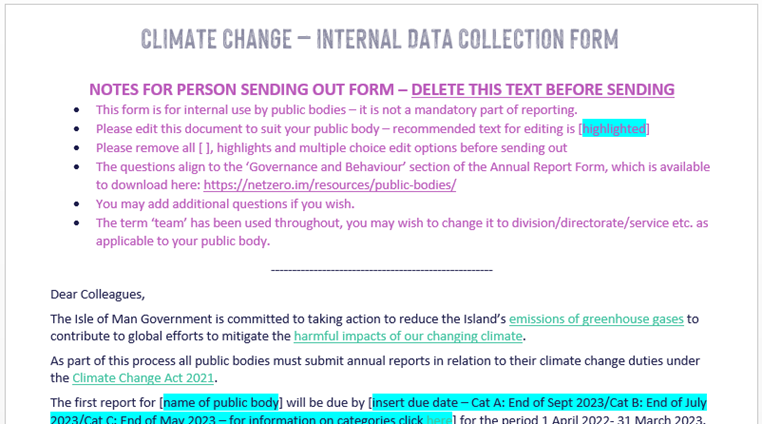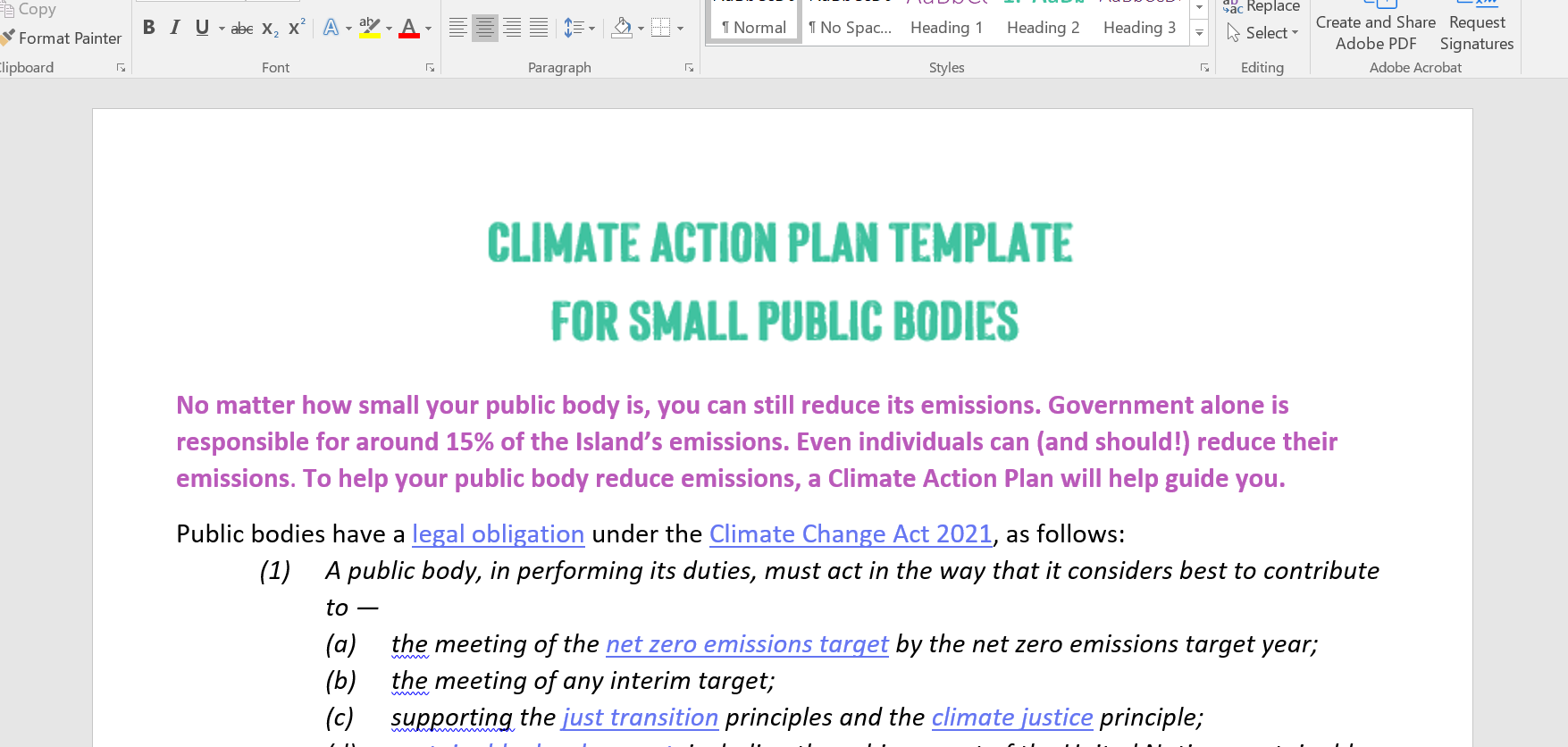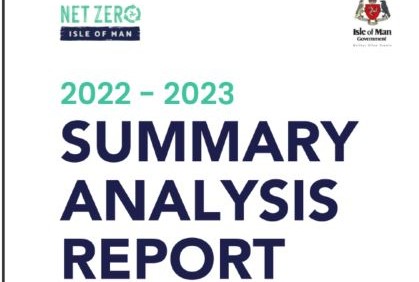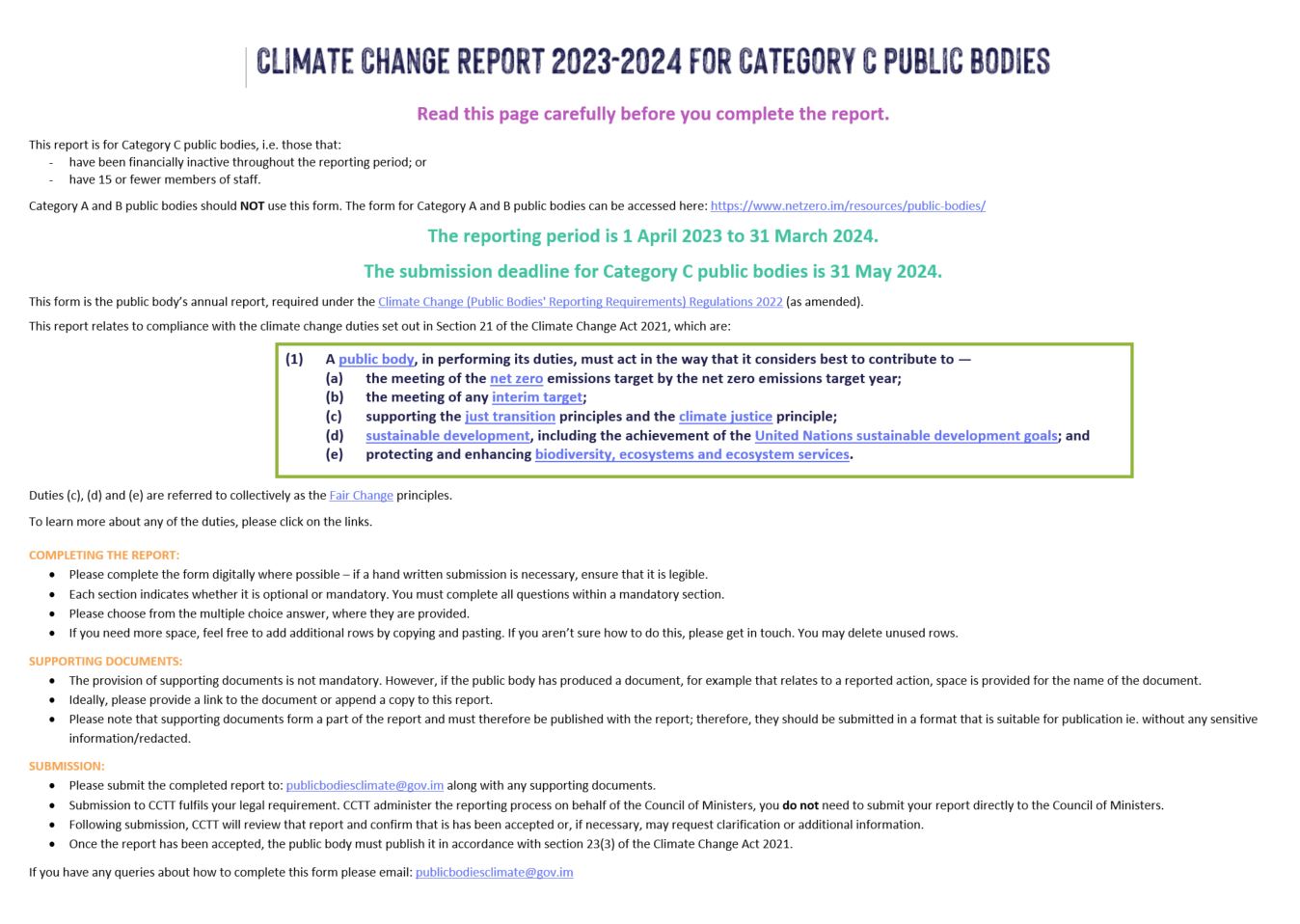Under the Climate Change Act 2021, public bodies in the Isle of Man have a legal obligation to support emissions reduction and the Fair Change principles of just transition, climate justice, sustainable development and the protection and enhancement of biodiversity, ecosystems and ecosystem services.
On this page you will find documents and guidance intended to help public bodies understand and implement the climate change duties.
If you have a query about the public bodies’ climate change duties, please email: PublicBodiesClimate@gov.im
CLIMATE IMPACT ASSESSMENT TOOL
A Climate Impact Assessment (the CIA Tool) is a decision making and policy development tool. The primary purpose of the CIA Tool is to guide policy development and decision making that aligns with the climate change duties for public bodies, set out in Section 21 of the Climate Change Act 2021.
Watch our 1 minute overview of the Climate Impact Assessment tool
Carbon Literacy Training
INFORMATION SHEETS
GUIDANCE
TRAINING
ENERGY CHAMPIONS
Vital to reaching our climate change goals is embedding positive attitudes and behaviours that demonstrate efficient use of energy. We seek to inform workplaces of their current energy consumption and the improvements that they are making over time. Continuing the Energy Champions Initiative that was started within Public Estates and Housing, we are working to change the culture of energy use and to promote energy efficient behaviour within the variety of workplaces that make up the government building portfolio. Through staff briefings and implementation of signage we have started to raise awareness of how our energy use affects us economically and ecologically. We are rolling out energy workshops demonstrating good attitudes and behaviours for staff to follow.
These cover:
- daily energy audits, examples of which are turning off monitors, lights and heaters when not in use and office reconfigurations such as consolidation of multiple fridges and freezers within departments to reduce surplus energy use.
- audit documents for use across workstations.
- case studies and success stories across departments to inspire greater change.
- joining the community of green groups within government contributing to monthly meetings to troubleshoot problems, we discuss progress and share ideas and successes.
- encourage involvement throughout all staff groups in competing for the Energy Champions TOP SPOT – visible through Energy Manager dashboards - a league table that displays our energy use per building and compares with other similar government buildings. Through these dashboards we can also see how close we are to achieving our targets.
LEGISLATION
FUNDING
FAQs
Public bodies are defined in the Climate Change Act 2021 by reference to the Freedom of Information Act 2015.
This means that any person, body, publicly-owned company or the holder of any office that is listed in Schedule 1 to the Freedom of Information Act 2015 is a public body.
A list is also available here: Netzero.im - What is a public body?
- Category A are public bodies with 150 or more FTE staff.
- Category B are public bodies with more than 15 but fewer than 150 FTE staff.
- Category C are dormant/inactive publicly owned companies OR those with 15 or fewer fte staff.
When determining a public body’s number of full time equivalent staff, employees of the Public Service Commission should be attributed to their stationed employer, as defined in the Public Services Commission Act 2015.
If you are unsure of whether a member of staff should be attributed to your public body, please contact the Climate Change Transformation Team.
The climate change duties are a legal obligation, set out in Section 21 of the Climate Change Act 2021, as follows:
(1) A public body, in performing its duties, must act in the way that it considers best to contribute to —
(a) the meeting of the net zero emissions target by the net zero emissions target year;
(b) the meeting of any interim target;
(c) supporting the just transition principles and the climate justice principle;
(d) sustainable development, including the achievement of the United Nations sustainable development goals; and
(e) protecting and enhancing biodiversity, ecosystems and ecosystem services.
Parts (c), (d) and (e) of the duties are referred to collectively as ‘Fair Change’.
Greenhouse gases (GHGs), released into the atmosphere by human activities, are causing our climate to change. Climate change poses many risks, for example: physical risks to people and property from extreme weather and risks to food supply chains, from damage to crops. It is therefore essential that we reduce emissions of GHGs to limit climate change as much as possible.
The climate change duties provide a common purpose across the public sector – so, although public bodies have different roles, responsibilities and priorities, they will all be working towards shared goals in relation to climate change.
GHG emitting activities are present in all areas of life and so every area of the Island’s public sector has a part to play. The duties help to ensure that climate action becomes embedded in the way the public sector operates – leading by example.
Fair Change is used to describe, collectively, the following parts of the duties:
- supporting the just transition principles and the climate justice principle;
- sustainable development, including the achievement of the United Nations sustainable development goals; and
- protecting and enhancing biodiversity, ecosystems and ecosystem services.
The way we make changes to combat climate change is extremely important. We need to do so in ways that benefit our community, economy and environment – otherwise we would be swapping one problem for another. The Fair Change principle help to guide socially, economically, and environmentally sustainable decisions with long-term benefits.
You can find out more in the Guidance for Public Bodies (section 6) and the Fair Change Framework.
Public bodies need to contribute toward reaching the national targets; however, the targets do not apply specifically to public bodies. So, for example, a public bodies should take reasonable steps towards reducing their own emissions but do not need to reduce its emissions by 35% by 2030 (the national interim target). Public bodies may set their own targets if they wish.
Switching to electric technologies, away from fossil fuels, is a good way to reduce emissions. However, there is nothing in the duties, which specifies these particular changes.
Public bodies should consider what is achievable and affordable when deciding which changes to make and when – for example, considering when vehicles/heating systems are due to be replaced anyway. It is important to note that switching to electric can bring long term savings, as these technologies are often more efficient than their fossil fuel counterparts – this should be considered when making plans to replace equipment.
Public bodies are strongly encouraged to consider efficiencies that could be put into place immediately, such as whether journeys can be shorted/combined or heating temperatures lowered.
Consumer preference and the ESG agenda are driving private companies to make changes that are very similar to the sorts of actions expected in relation to the climate change duties. If a public body is operating in commercial markets and does not keep pace with the private sector on reducing emissions, then it could lose business. The climate change duties are therefore not seen as creating a competitive disadvantage for public sector organisation. This view is supported by the Office of Fair Trading.
Funding is available to Government Departments, please see this guidance and the Terms of Reference.
For other public bodies, funding should be raised through the normal processes.
If a desired change is not achievable due to availability of funds, public bodies should consider phased/future implementation, efficiencies in other areas and any long-term savings that might make the project affordable.
All of the changes needed to reach net zero will not happen immediately – public bodies are expected to make best efforts and will not be penalised for not taking actions that are outside their ability to take.
Climate action is not just about large-scale, expensive changes (eg. replacing fleet) and public bodies are encouraged to consider actions/changes that are low- or no-cost, for example, changing behaviours around building and vehicle use can reduce fossil fuel consumption, saving money without incurring cost.
Reporting by public bodies covers a small number of high-level emissions indicators, for gauging change and the progress of climate action within the public sector.
Public body reporting does NOT feed into the Isle of Man’s national GHG inventory and is intended to indicate trends, rather than being a report in granular detail.
One of the most important parts of the report is the quantitative data about what actions a public body has taken and emissions/consumption data must be viewed alongside that information.
Estimated data is common in emissions reporting. The reporting form will enable public bodies to indicate where data is estimated, incomplete or unavailable.
Public bodies will not be deemed non-compliant if they have made reasonable efforts to obtain information.
See also 3.c. Properties/vehicles managed by DoI
Many public bodies occupy buildings that are managed by Estate Shared Services or use vehicles managed by Fleet Services. Work is on-going between the Climate Change Transformation Team and the Department of Infrastructure to facilitate the provision of information out to individual public bodies.
See also response to question 3.b. Missing, estimated and incomplete data.
No, as per the answer to question, public bodies reporting covers a small number of high-level emissions indicators, for gauging change and the progress of climate action within the public sector.
Public body reporting does NOT feed into the Isle of Man’s national GHG inventory and is intended to indicate trends, rather than being a report in granular detail.
Category A public bodies – 6 months from end of reporting period (so, reports due before end of September)
Category B public bodies – 4 months from end of reporting period (so, reports due before end of July)
Category C public bodies – 2 months from end of reporting period (so, reports due before end of May)
As the content of the reports is currently limited to a small number of high-level emissions indicators and qualitative data on actions undertaken, the reports will be analysed internally by the Climate Change Transformation Team. The first reports will inform the way forward and external analysis may be implemented for future reports.
The reports will be received initially by the Climate Change Transformation Team who will use the contents to prepare two reports:
- Report for publication, subject to approval by the Council of Ministers.
The public report will:
- use amalgamated statistics to indicate trends across the public sector
- provide case studies on actions/projects highlighted by public bodies in their reports
The public report will not:
- Comment on the compliance or non-compliance of any individual public body.
- Compare emissions reduction between public bodies
- Internal report, for the Council of Ministers
The internal report will inform Council, based on the reports, of:
- additional support/guidance CCTT believe is necessary;
- barriers to emissions reduction within the public sector and recommendations for addressing them;
- in respect of any public bodies that appear to be non-compliant:
- the reasons for such appearance
- whether an investigation is recommended; and/or
- what action could help that public body achieve compliance
See ''What are the reports used for?''
Public bodies will not be required to provide consumption data in relation to buildings or vehicles that they own but have rented or leased out.
In relation to buildings, where a public body controls the type of heating system installed in the property (but not the use of that heating system) future reports may request numbers of different types of heating systems installed – as an indicator of whether fossil fuel heating systems are being replaced for low carbon systems. It is not intended to request this information for the first reporting period, based on feedback from public bodies that the initial content should be kept as minimal as possible, due to resource and data challenges.
No - Scope 3 emissions are NOT REPORTABLE.
It is very difficult to accurately calculate this scope of emissions. Therefore, they are not currently included in public body reporting.
While you do not need to calculate these emissions, public bodies to consider their impact on these emissions as it can be extensive. For example, by avoiding unnecessary purchasing, buying locally or choosing reusable rather than disposable items were appropriate.
See section ‘5.3.4.1. Consumption and procurement’ of the Guidance for Public Bodies for more details.
No – business travel is a Scope 3 emission and is therefore not currently reportable.
However, public bodies are encourage to consider these emissions and reduce them where possible by only travelling when necessary and choosing boat and rail/coach where possible instead of air travel.
Determining whether or not a public body is compliant will be based on the following principles:
- The reporting process is not intended to be punitive. Where public bodies do not meet expectations of compliance, the aim will be to identify and resolve issues.
- Where public bodies are actively working towards compliance, but may not have fully achieved all aspects, this should be viewed positively and not as non-compliance.
- Non-compliance is a matter of wilful disregard for the duties or failure to take (or work towards) appropriate, reasonably practicable measures to implement them.
Commencement of the non-compliance procedure, set out in the ‘Climate Change (Public Bodies’ Reporting Requirements) Regulations 2022’ is a decision that rests with the Council of Ministers.
No - Emissions data alone does not provide a full picture of climate action. For example, as public bodies move toward electric alternatives for heating and transports their Scope 2 emissions will increase (while their Scope 1 emissions decrease). If public bodies are taking appropriate, reasonably practicable measures to comply with the duties, they will not be found non-compliant.
